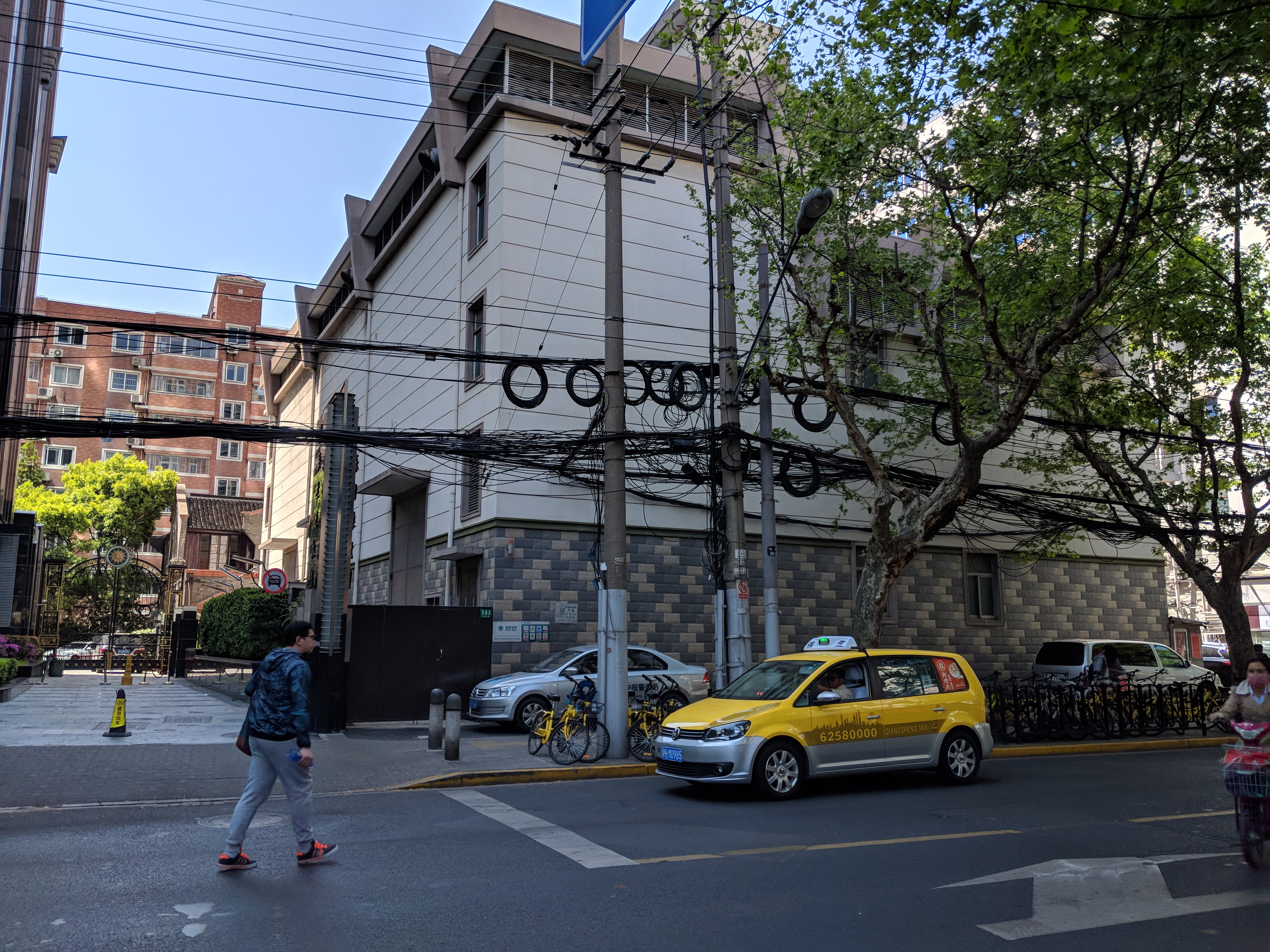
A few years ago, I wrote up a mini-travelogue -- a compilation of incidents/anecdotes I found interesting, rather than "sights" -- of our trip to Japan. It turned out to be rather popular, so I then decided to write on our trip to Hangzhou and Ningbo in 2016, and now am writing on our trip to Ningbo again in April 2018. I gave a talk at a university in Shanghai, very stimulating and enjoyable, and we attended to some family matters. So, let's get started with my account.
Earlier this year, my wife and I both very much enjoyed a book, Street of Eternal Happiness, concerning a major Shanghai street of the same name 长乐路 ("long happiness road"). The author, NPR reporter Rob Schmitz, actually lives on that street, and interviewed a number of people who live or work there. The book tells their stories, most of which involve some struggle, such as economic, family or "fighting City Hall." Since my wife's family lived on that street many years ago, the book was especially captivating.
One of the people profiled was a Ms. Zhao, one of the multitude of "immigrants" who live in Shanghai. She is from the Northeast province of Shandong. Like many, she came to the city long ago to seek economic betterment, though she told us Shandong is doing quite well these days. She owns a flower shop on this street.
We had forgotten to jot down the address of the shop, and as the street is about two miles long from end to end, our search was really like looking for a needle in a haystack. After an hour, we were just about to give up, when I suggested walking one more block, and there it was! If you ever happen to be in the neighborhood, it's at the corner of Chengdu Lu (成都路), across from a pretty park.
My wife said, "Hello, Ms. Zhao. I've never met you before, but I feel like I know you!" The shopkeeper looked puzzled for a moment, and then said, "Oh, you must mean that book!" She was a delight to talk to, and mentioned that she had had other readers of the book come visit as well.
We also wanted to go to another business profiled in the book, "Your Sandwich, 2nd Floor," but alas, were told by the people next door that it had closed a couple of months earlier. The man had built a successful accordion business, but was at loose ends, trying to "find himself." It would have been interesting to chat with him.
This street is in the former French Concession. Putting aside the ignoble historical aspects, one has to say it is a beautiful part of the city, lined with a species of sycamore called plane trees. The street is narrow enough so that the leaves of trees on both sides touch, creating a "tree tunnel." It is so thick that the street gets dark much earlier in the afternoon than its surroundings. It is still a popular residence area for foreigners who work in the city. In one case (we visited the street on several different occasions), we saw several very Caucasian kids walking, chatting in perfect Chinese.
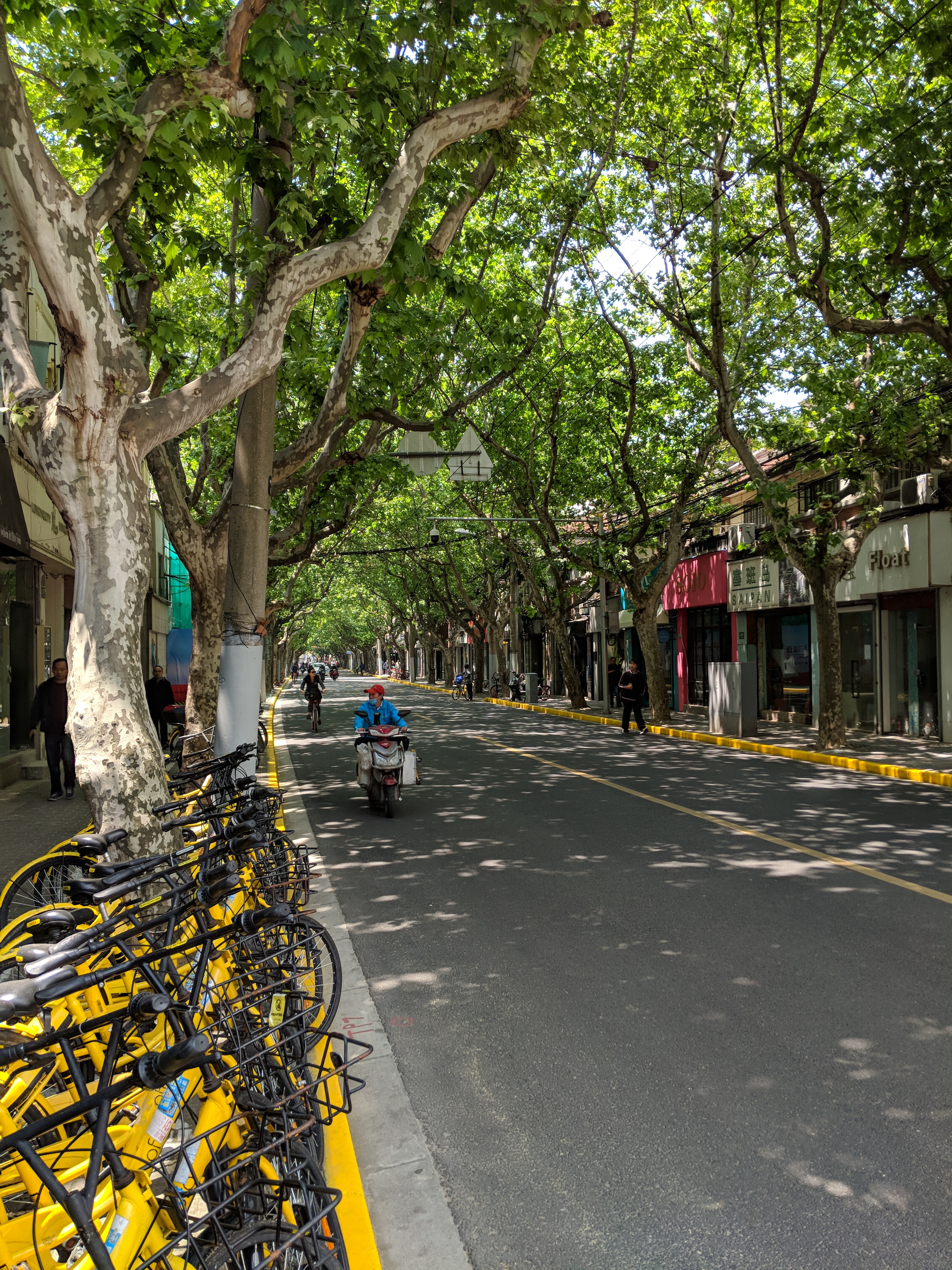
Later that week I visited East China Normal University, one of China's oldest institutions. The campus I visited is just a few years old, in one of Shanghai's developing areas, rather remote. (From downtown, I took three subway trains, then a brief cab ride.) It's an attractive, modern campus, as you see see in their main library below.
A friend Yihui, who is big in the R programming language world, arranged for my visit, hosted by Prof. Tang Yincai. I had a great conversation with him and his colleagues, over a wonderful lunch. The talk went well, I think, and they asked insightful questions.
The university is apparently a major R stronghold in China, good to see. I think part of this is due to Professor Tang. After the talk, they held a meeting of their local chapter of Capital of Statistics, a delighfully-named China-wide R user group of which I believe Yihui was a founder. They call their meetings "salons."
A couple of their members gave short talks in Chinese. Due to my weak Chinese, my lack of knowledge of technical terms and, I must add, their speaking in a mumble :-) , I understood rather little, but it was fun anyway.
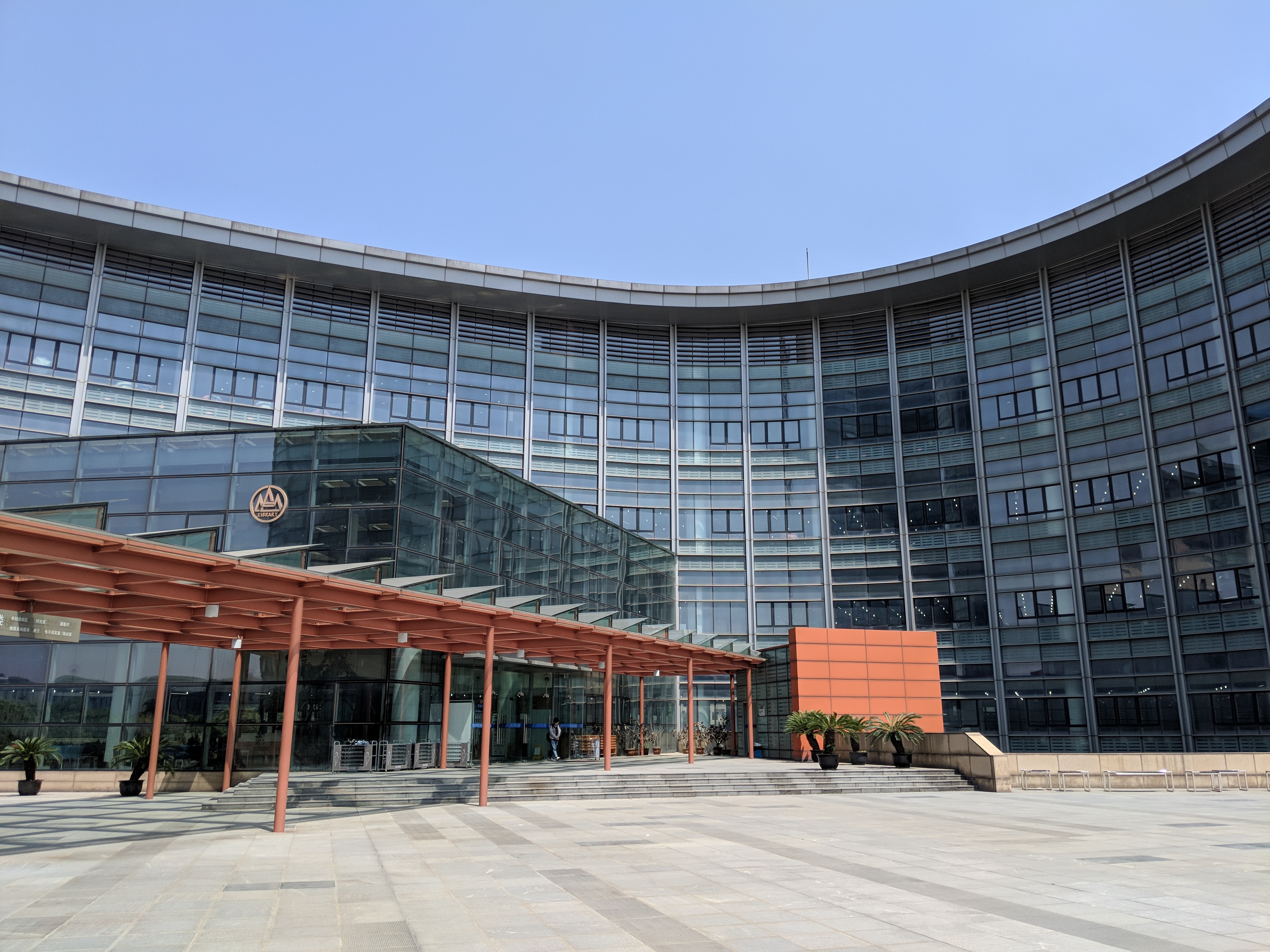
The day before we left for Ningbo, I happened to see this store named Children's Foods. It actually was a high-end, expensive speciality food seller, not related to kids. (There is also a Women's Foods.) I jokingly asked one of the clerks whether the foods were suitable for me as an adult. She laughed, and assured me it was OK. :-)
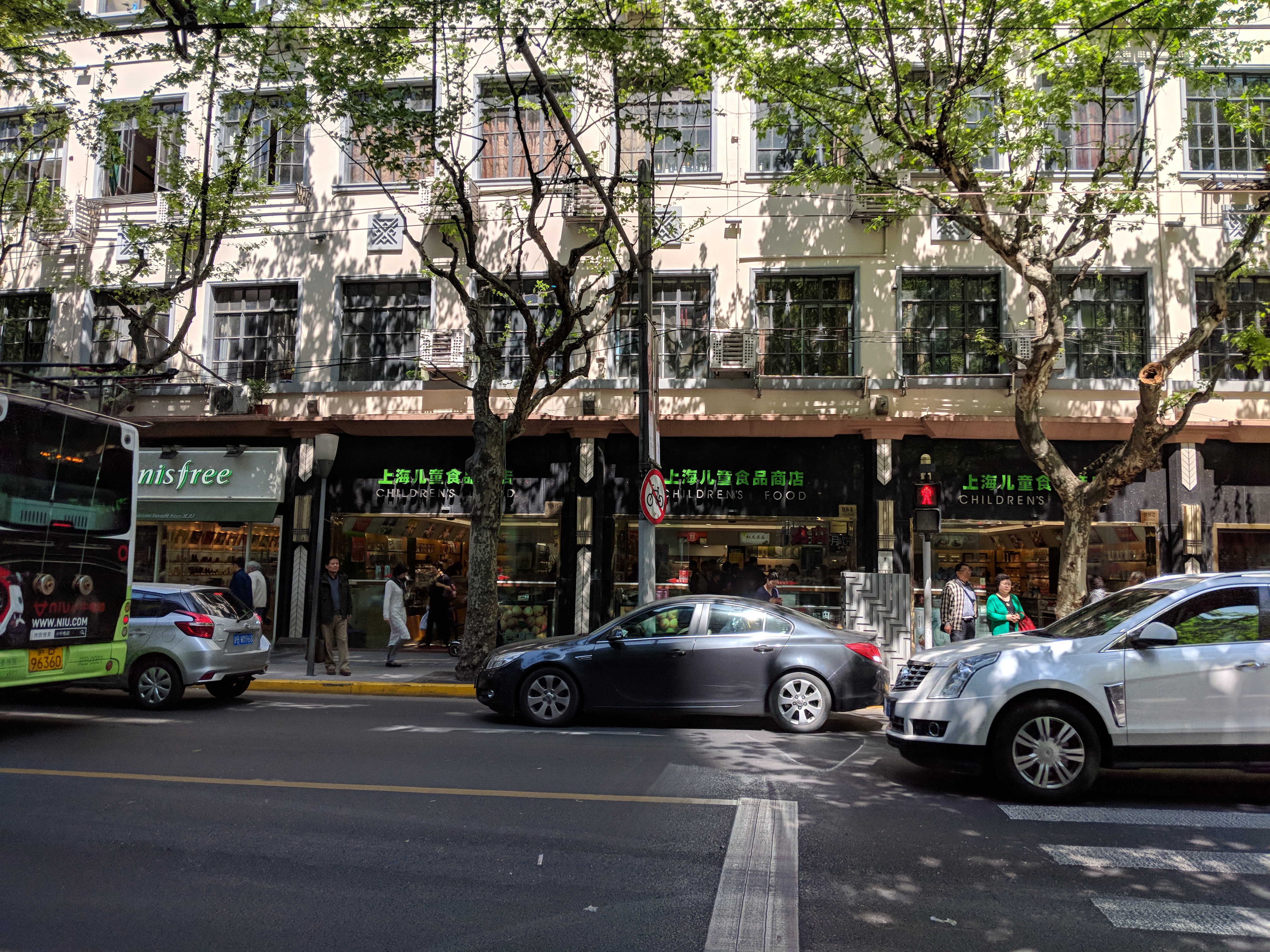
Delivered hot food is especially popular now, possibly due to everyone being so busy these days. Below is a shot of a bunch of food carriers on their motor scooters, waiting for food to deliver. This was on Yuyuan Road in Shanghai (I'll get to Ningbo below), but of course it was similar in Ningbo. In one instance, we saw a young deliverer race into our Ningbo hotel, breathlessly tell the desk he had a delivery, and a couple of minutes later, return to the lobby and race to his motor scooter for his next stop. Not an easy life.
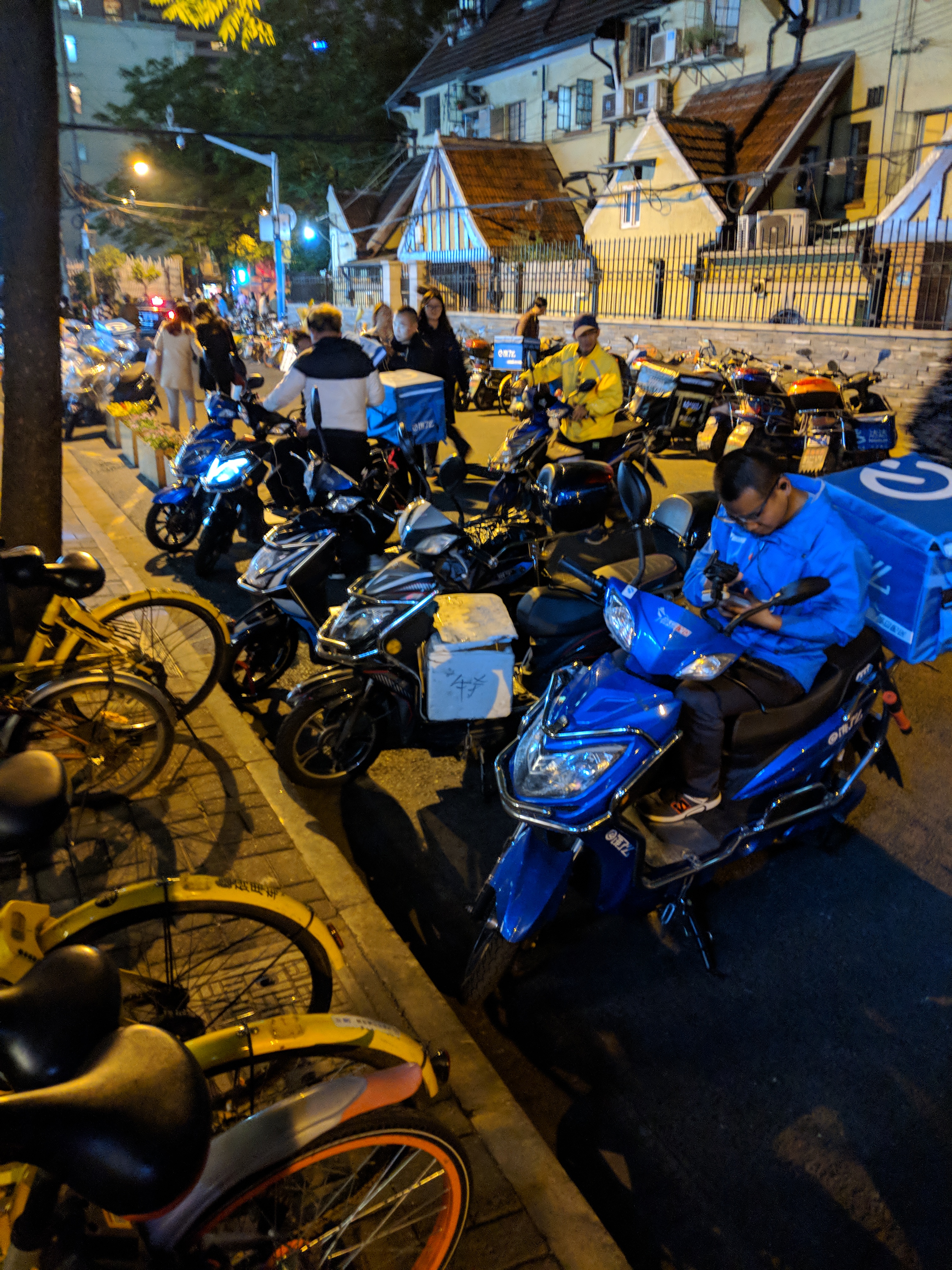
The guys on modern motor scooters contrasted with another type of food delivery, a Chinese analog of America's Meals on Wheels.
The signs say "Shanghai Foundation for the Elderly" and "Meal Delivery Car for Helping the Elderly." I told the driver that we have such a service in the U.S. too, and he nodded in approval.
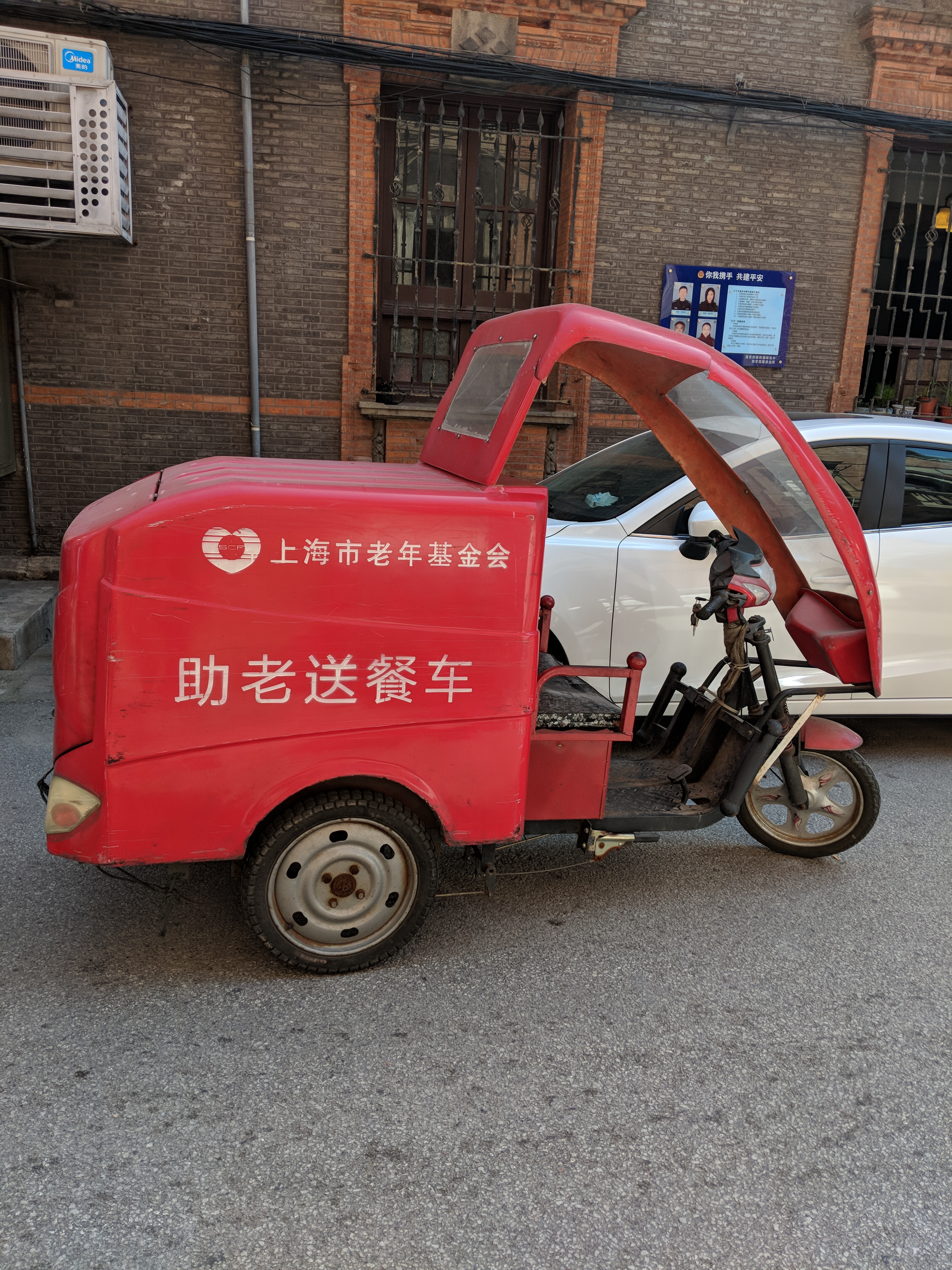
We took the bullet train to Ningbo, a major seaport 100 miles or so south of Shanghai. Sitting next to me was a man who has some kind of General Manager title for a Chinese electronics firm, who discussed ZTE, the subject of some friction with the U.S. lately.. He was very upset, as the U.S. policy toward the firm was bringing it to some hard times. Interestingly, he gave the same argument one hears from the pro-globalism people in the U.S., "It's a global economy now, we all benefit etc." I did not comment. (During my university visit, an administrator had expressed their concern that Pres. Trump might put restrictions of Chinese students who wish to study in the U.S. I replied simply, "This is a complicated issue," and the person took the hint, dropping the subject.)
Ningbo is a beautiful city, with three rivers intersecting there.
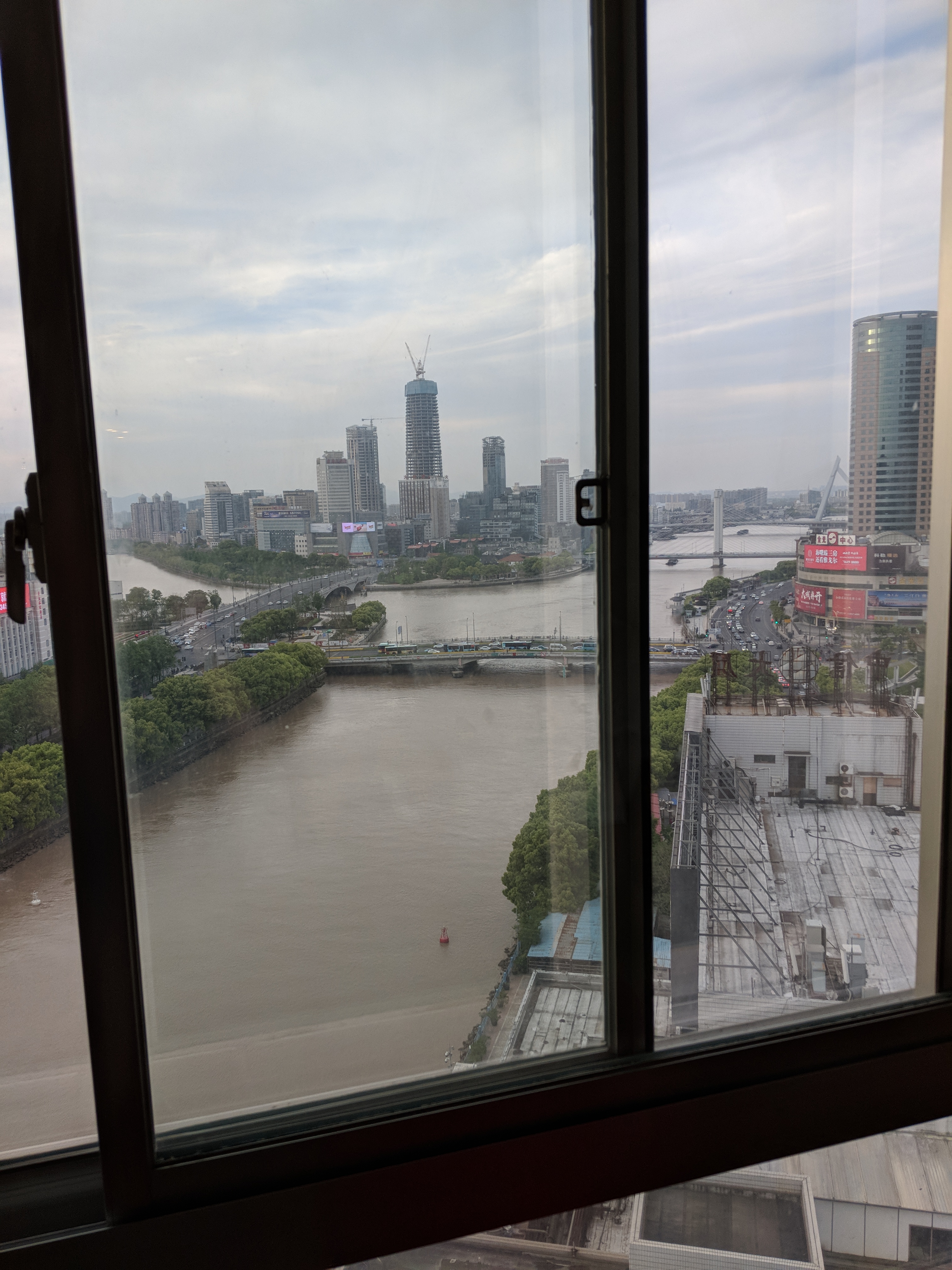
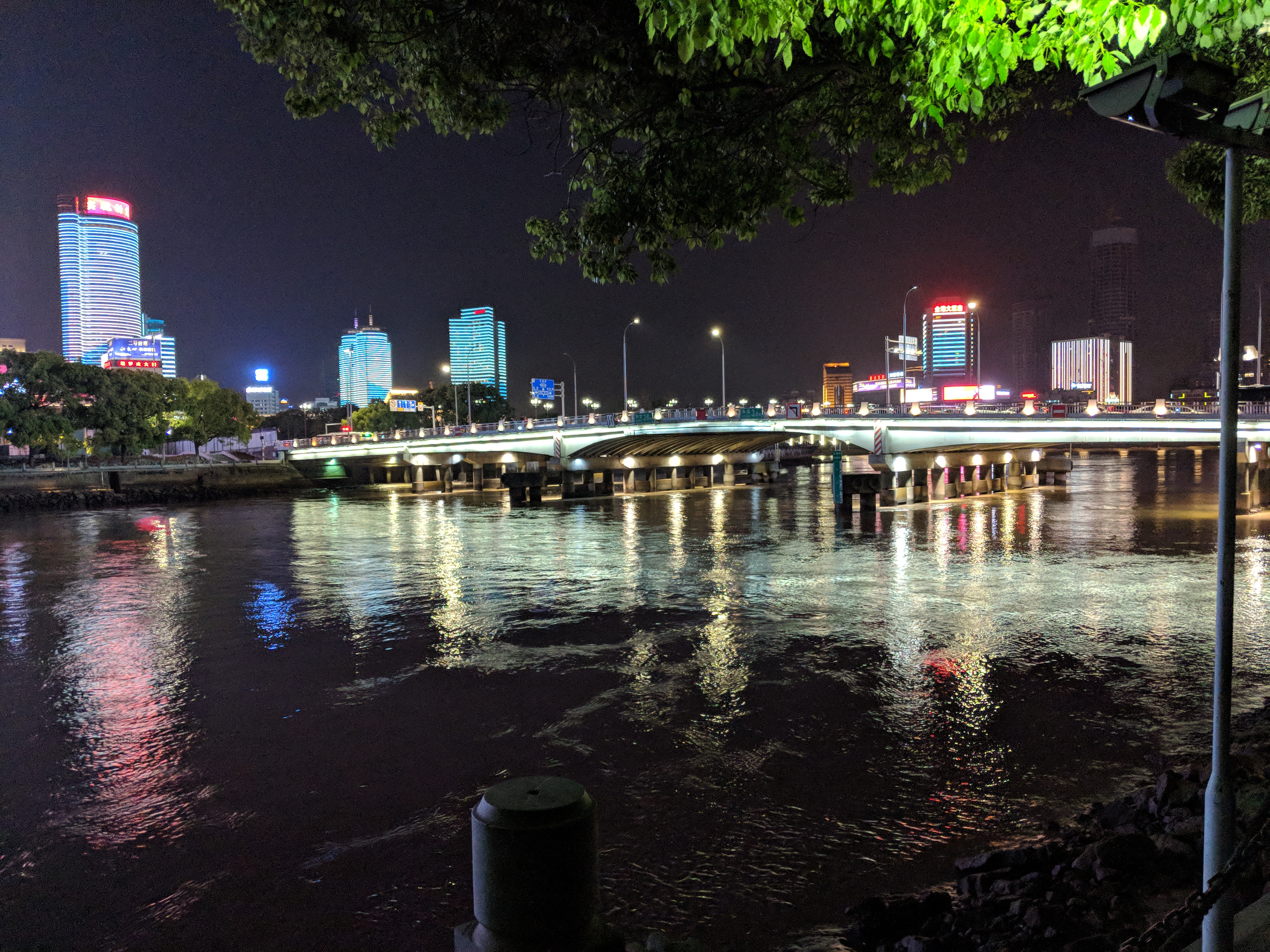
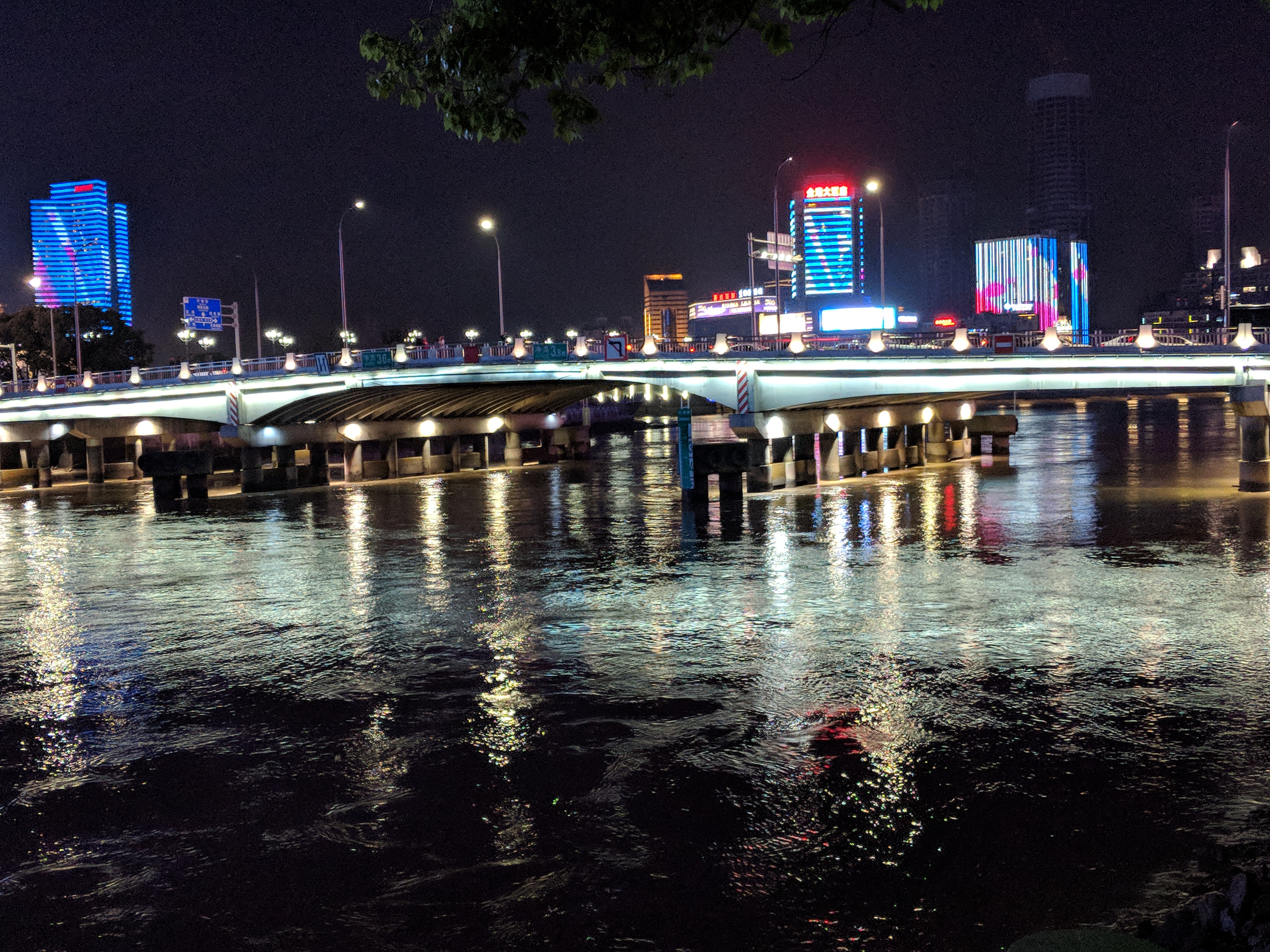
The Ningbo dialect is very similar to that of Shanghai, though with its own idioms and a bit higher in pitch I'd say. Since I've been hearing Shanghainese in my in-laws for many years, I can follow it somewhat well, but Ningbo Hua is one further step away. Anyway, I still love to listen to those languages.
Ningbo is famous for its seafood. We were told that there was one "must try" restaurant, described in Cantonese by my wife's niece as yauh peng, yauh leng -- "Both inexpensive and beautiful." As is common there, the food is laid out for one to choose from, after which it is cooked and served.
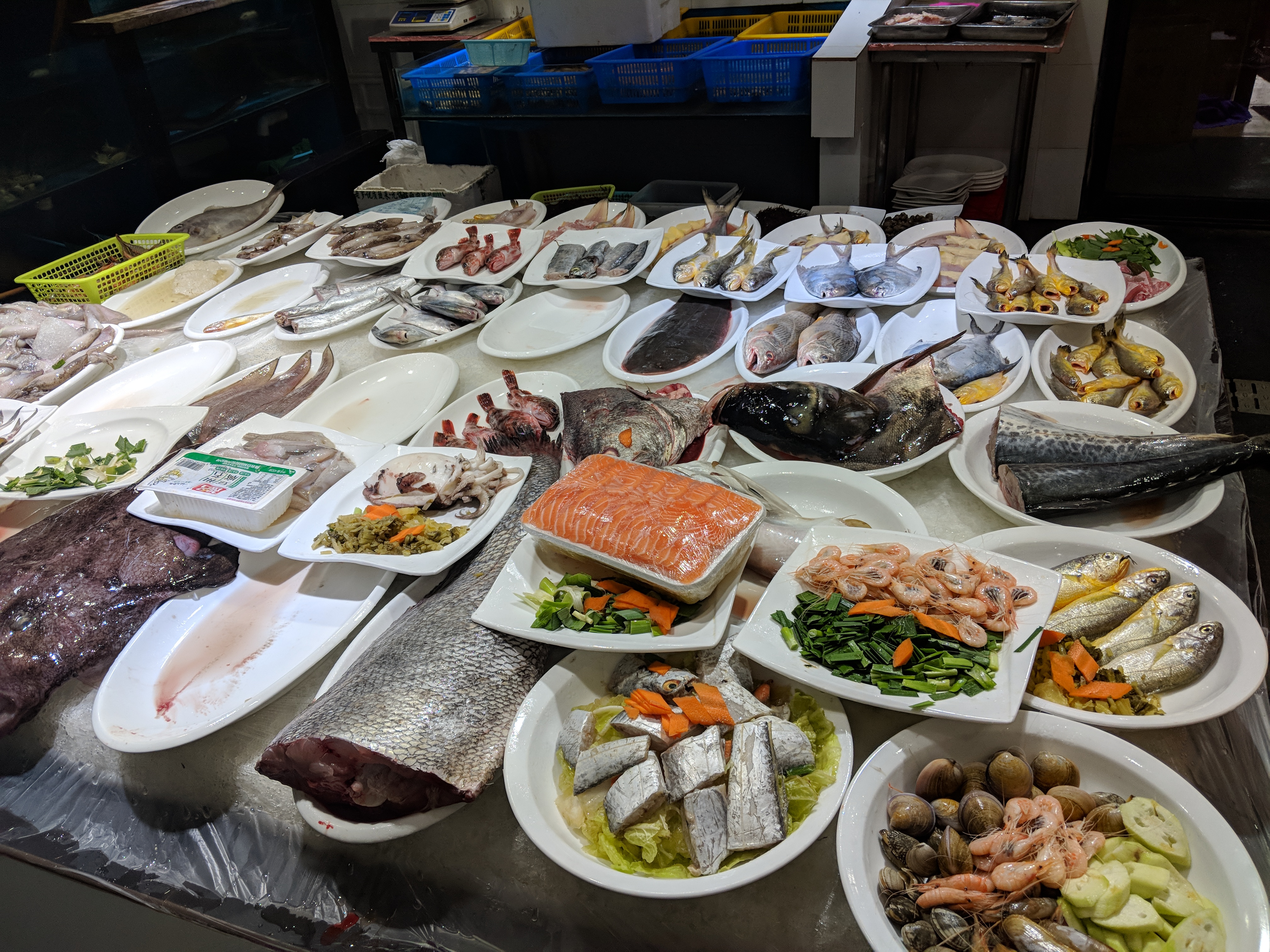
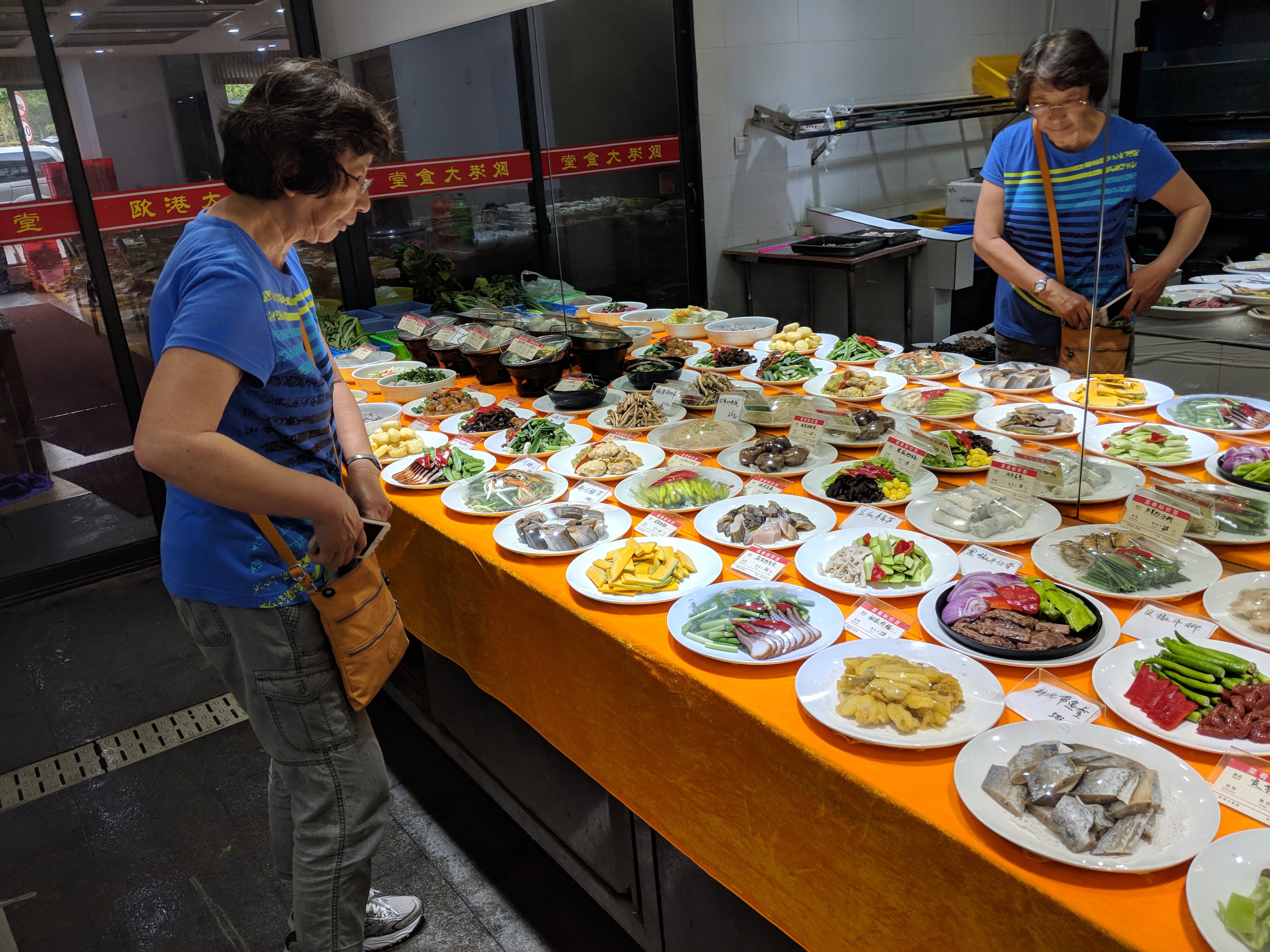
The restaurant is amazingly informal. The apparent owners, husband and wife, good naturedly spoke quite loudly to each other and to regular customers throughout the time we were there. One patron even changed his shirt right there in the middle of the restaurant! When I asked the owner whether I could take pictures, he said "Of course!", quite a contrast to the snooty man in charge of the Shanghai Children's Foods store I mentioned above.
The sign outside the restaurant says, "Every day a special price, every day a surprise."
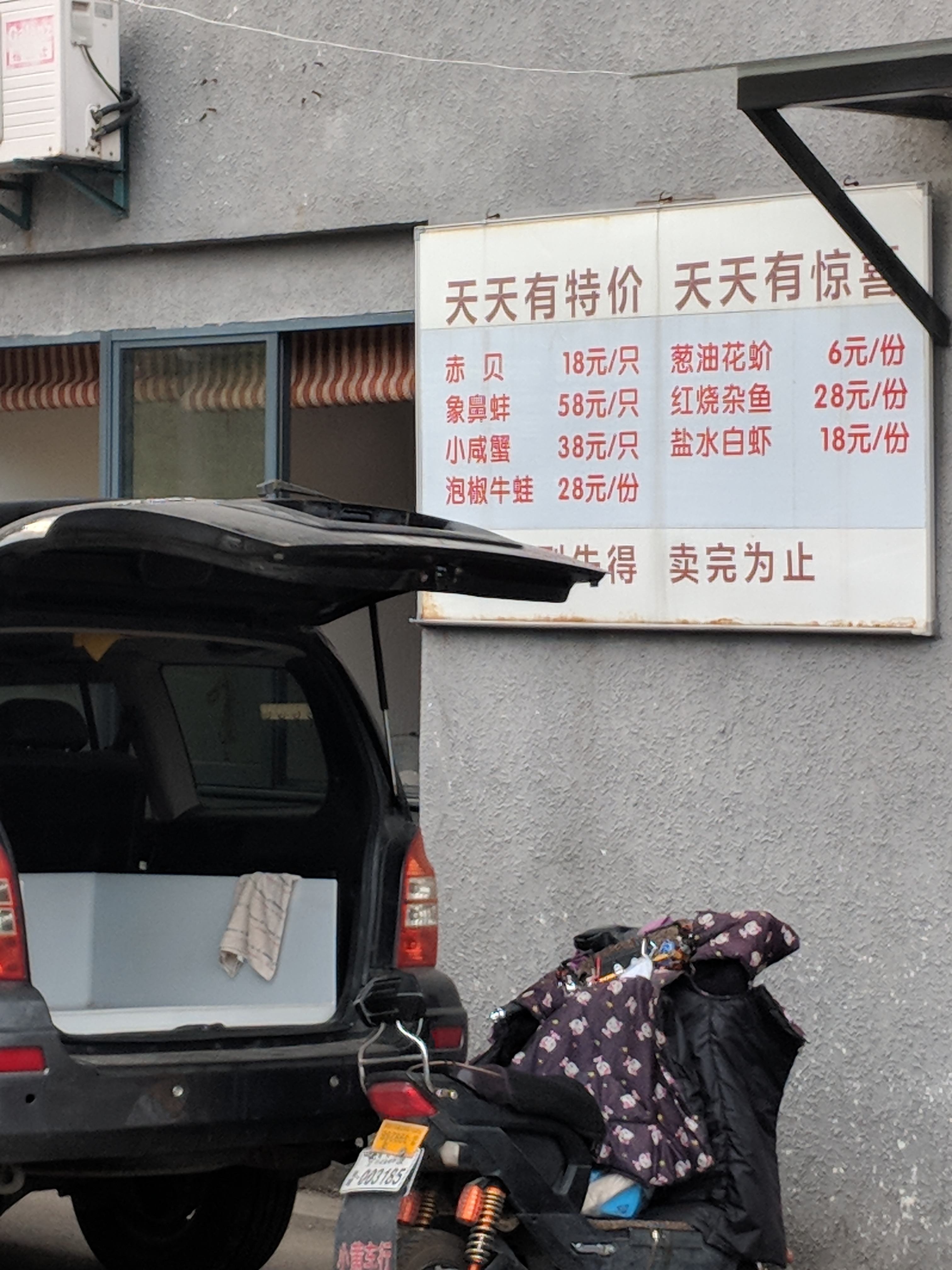
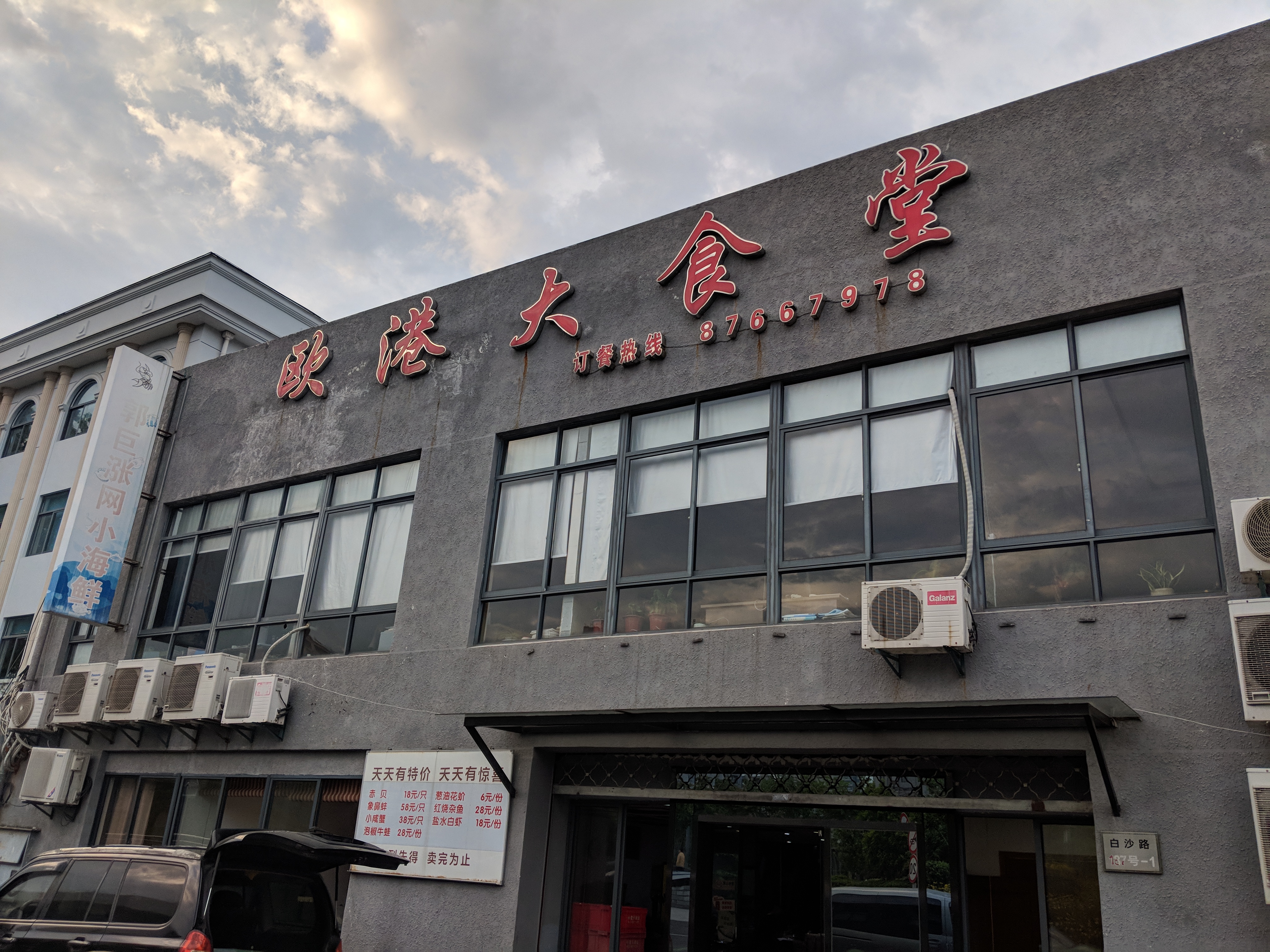
One day in Ningbo my wife and I had been doing a lot of walking, so we dropped into a bookstore in the Tian Yi Mall (天一广场). in hope of finding some place to sit down. It's a beautiful store, and the manager later told me that it was the second-largest, after the famous "Book City" (书城) in Shanghai. I say "later," as an amusing and rather embarrassing incident occurred first.
There were indeed places to sit down -- chairs were arranged for a talk by an author/artist, about medicinal plants:
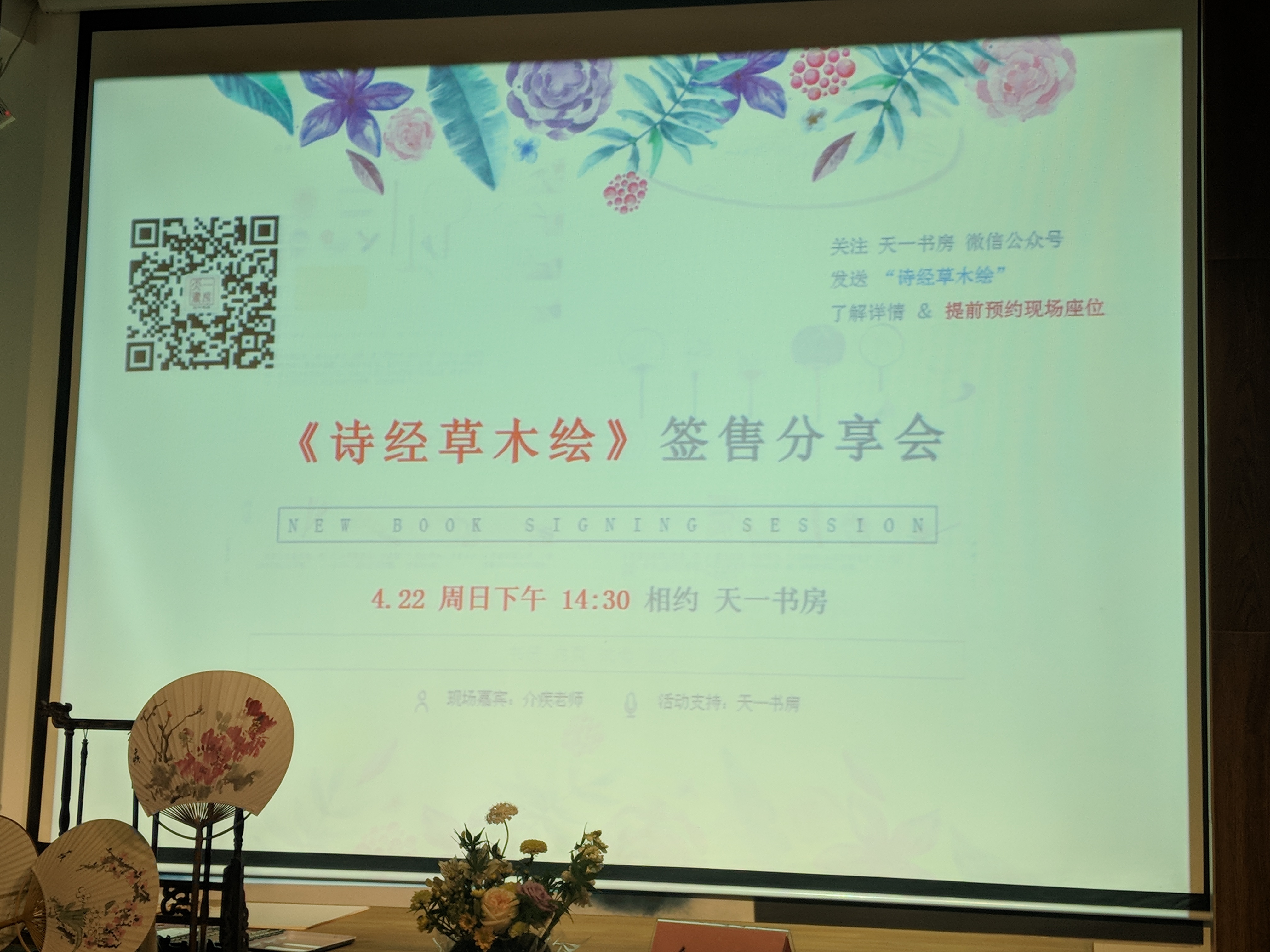
The author did give his talk. He also gave the audience a quiz. The woman sitting next to us, in the "36" jacket (don't ask, I have no idea) in front of Manager Sun in the picture below, answered two of the questions. The author gave her two hand-painted fans as prizes, but she in turn gave both to my wife and me; that actually turned out to be a hint of what was to come.
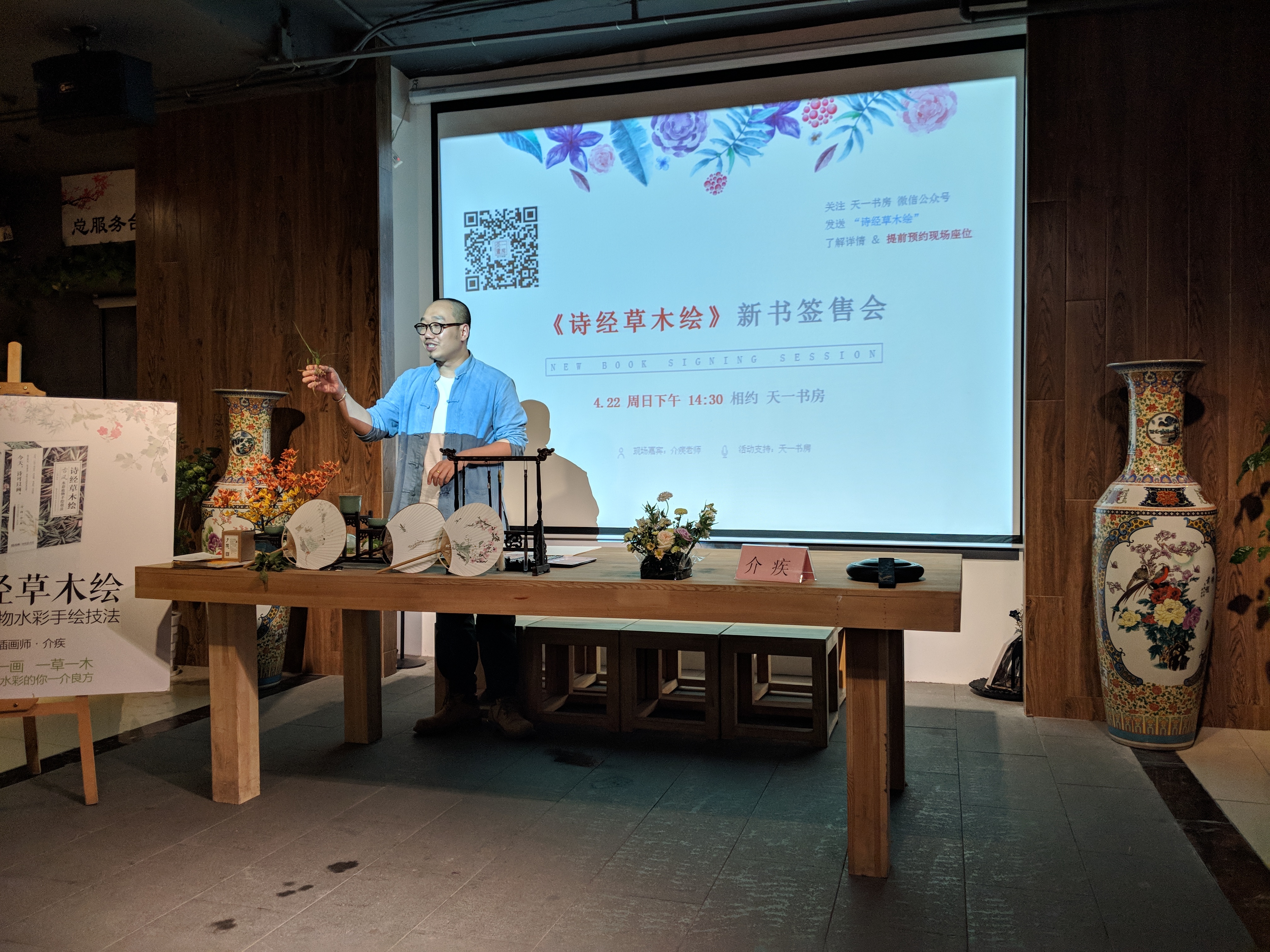
Afterward, the manager, Ms. Sun, said it was time for questions from the audience.
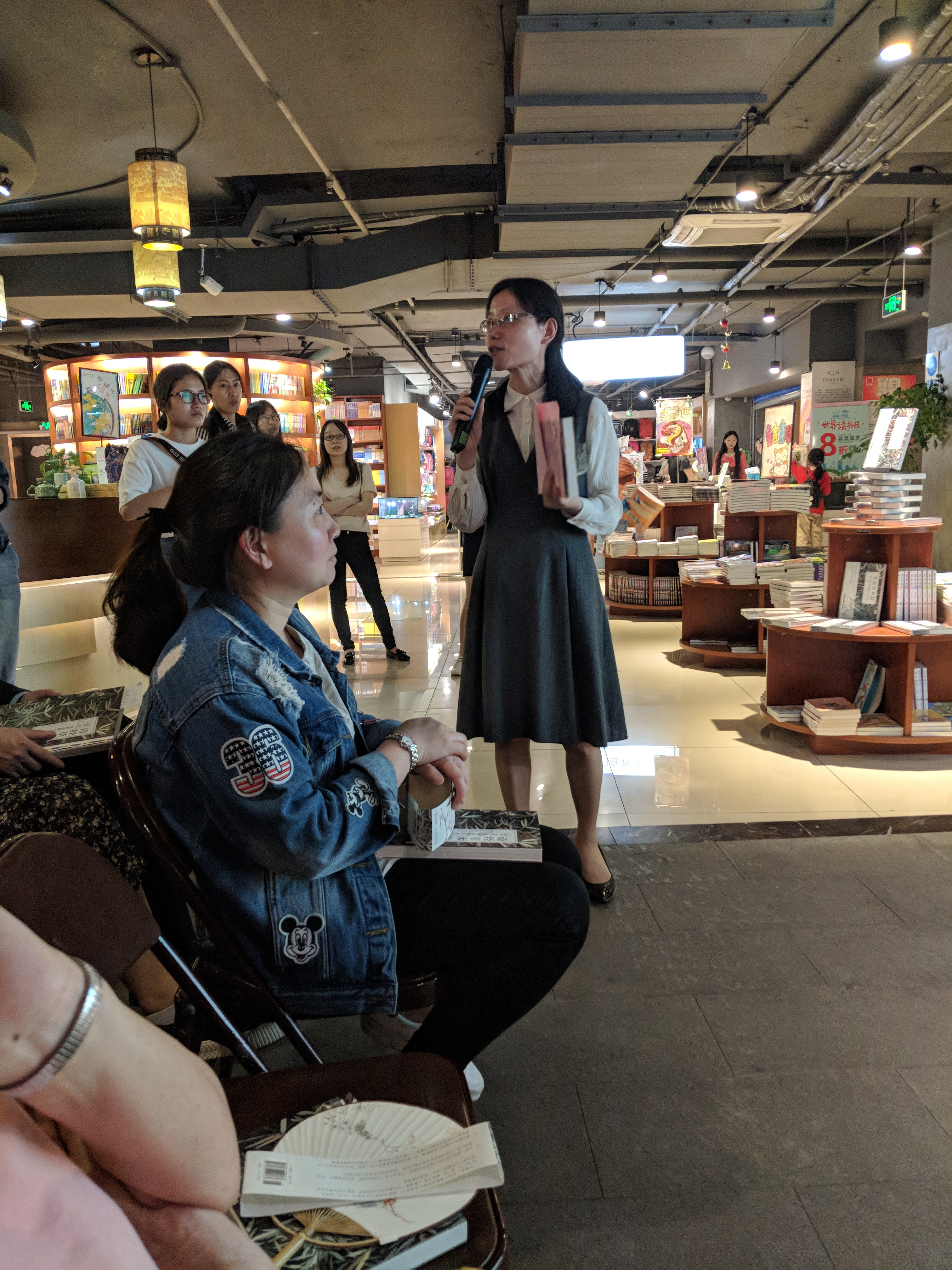
But first, she made a beeline straight for me! I was the only Westerner in the audience, and since I was sitting there, she naturally assumed I had enough facility in Chinese to understand the author's abstract, highbrow, historical talk, right? :-) But of course I actually did not follow the talk that well. So as soon as Ms. Sun stuck the microphone in my face and asked a question, I objected that I would not understand. But my wife told Sun to ask anyway, and the manager asked how many of those plants I had recognized in the author's talk. I replied (quite truthfully), "None!" ("一个都没有"). Everyone laughed.
But while the author was engaged in his book signing -- book PAINTING, actually, as he drew a plant in each book -- the manager had a long chat with me, which was quite interesting. Upon learning I am in tech, she pleaded the case for the importance of the humanities. I fully agree, of course -- hey, I had just attended that talk, right? :-) -- and told her that I too am a bit of a writer. She told me that the author himself is a recovering techie, a former programmer.
She mentioned that her husband had a math degree, but her own academic math career had ended with calculus, where she had hit a brick wall. I told her how important intuition is in math, but I didn't know a Chinese term for it. I described it for her, and she agreed that it is crucial to be able to "imagine" (想象)what is occurring, not a bad description of intuition at all.
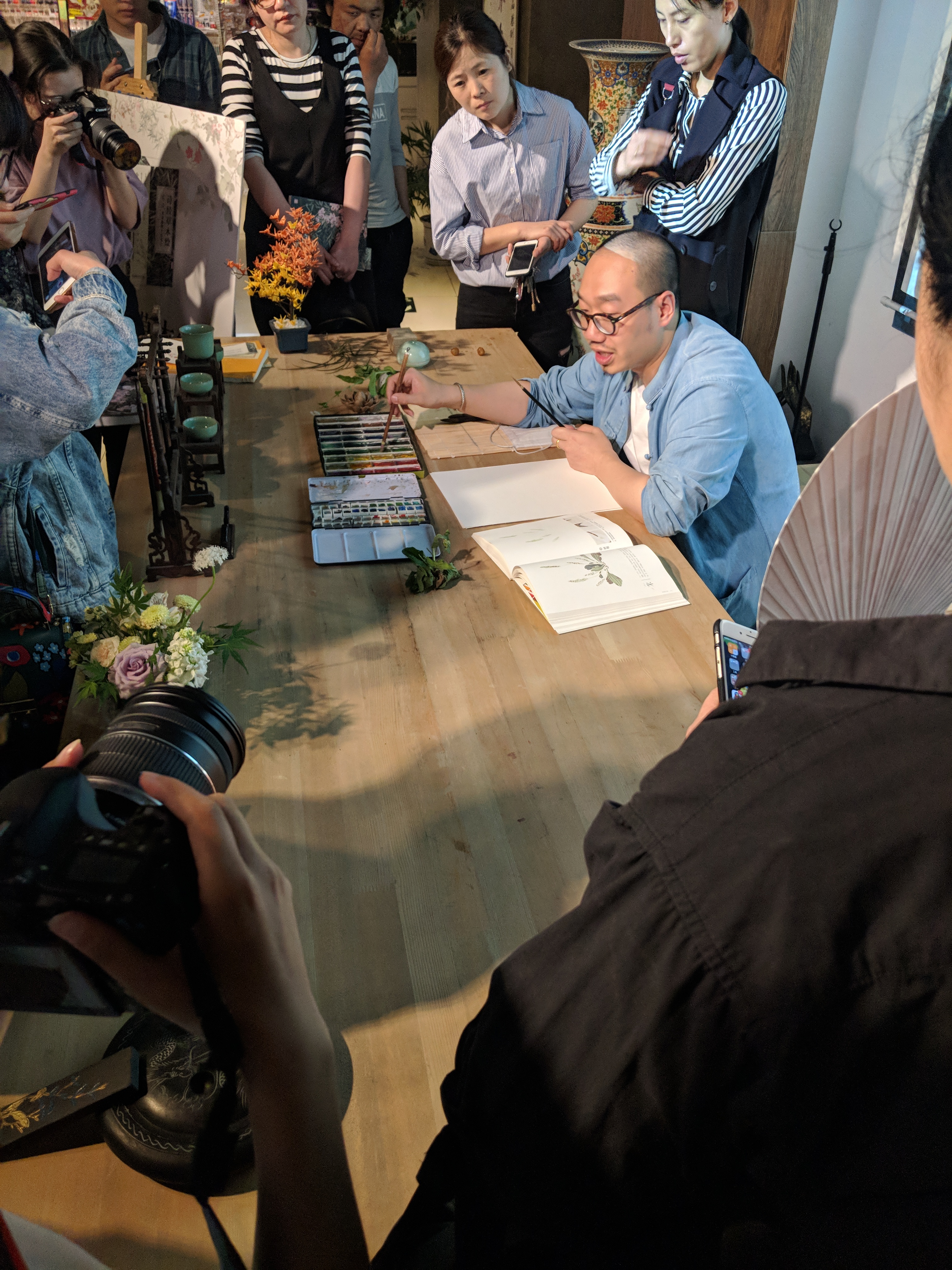
The very modern Ningbo subway had a phone charging station, with cables ready for almost any kind of phone. Those tidy, attractively arranged electric wires were in contrast to the jumble of exposed wires we encountered in one of the fanciest areas of Shanghai.
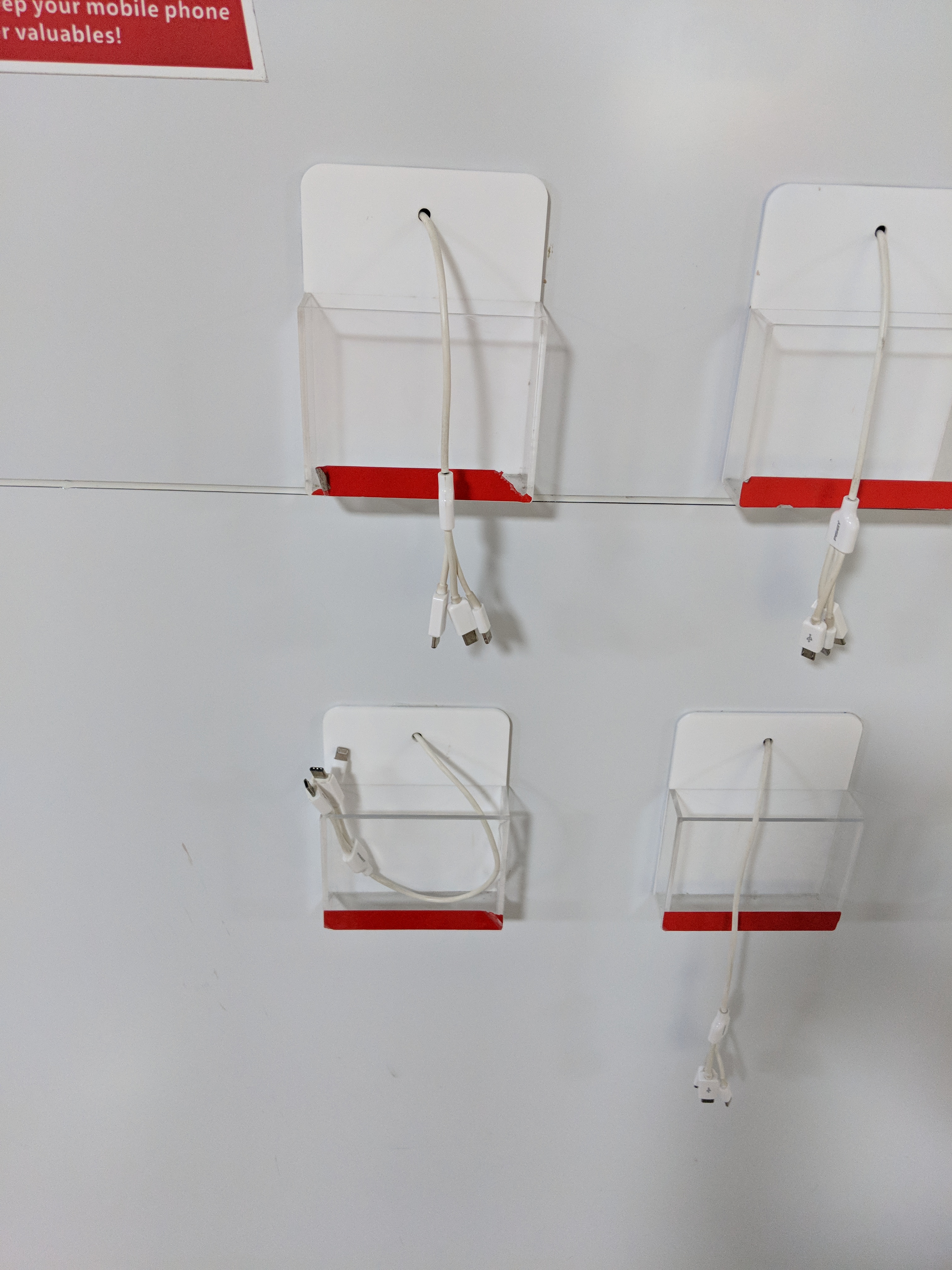

This typifies China's very rapid development, especially in the last 10 years. Some things are extremely modern while some others have not yet caught up. Shanghai builds a new subway line almost every year, amazing.
Also in the Ningbo subway, a nice culinary tour of the city, through the four seasons of the year:
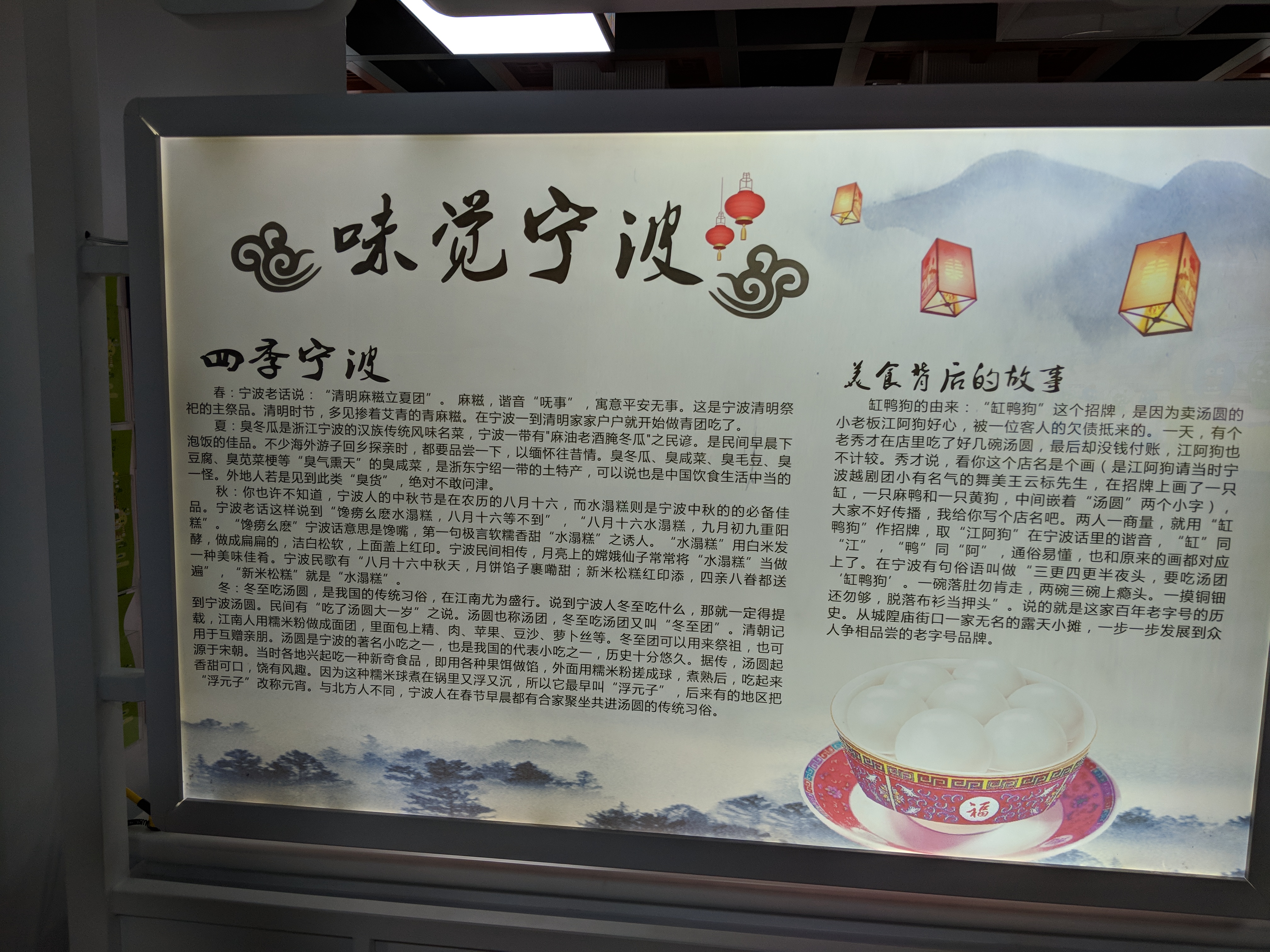
There has in recent years been a campaign in China to be "wen ming" (文明), i.e. civilized. Be nice to everyone, be polite and so on. One sees these slogans everywhere, along with exhortations for democracy, justice and so on:
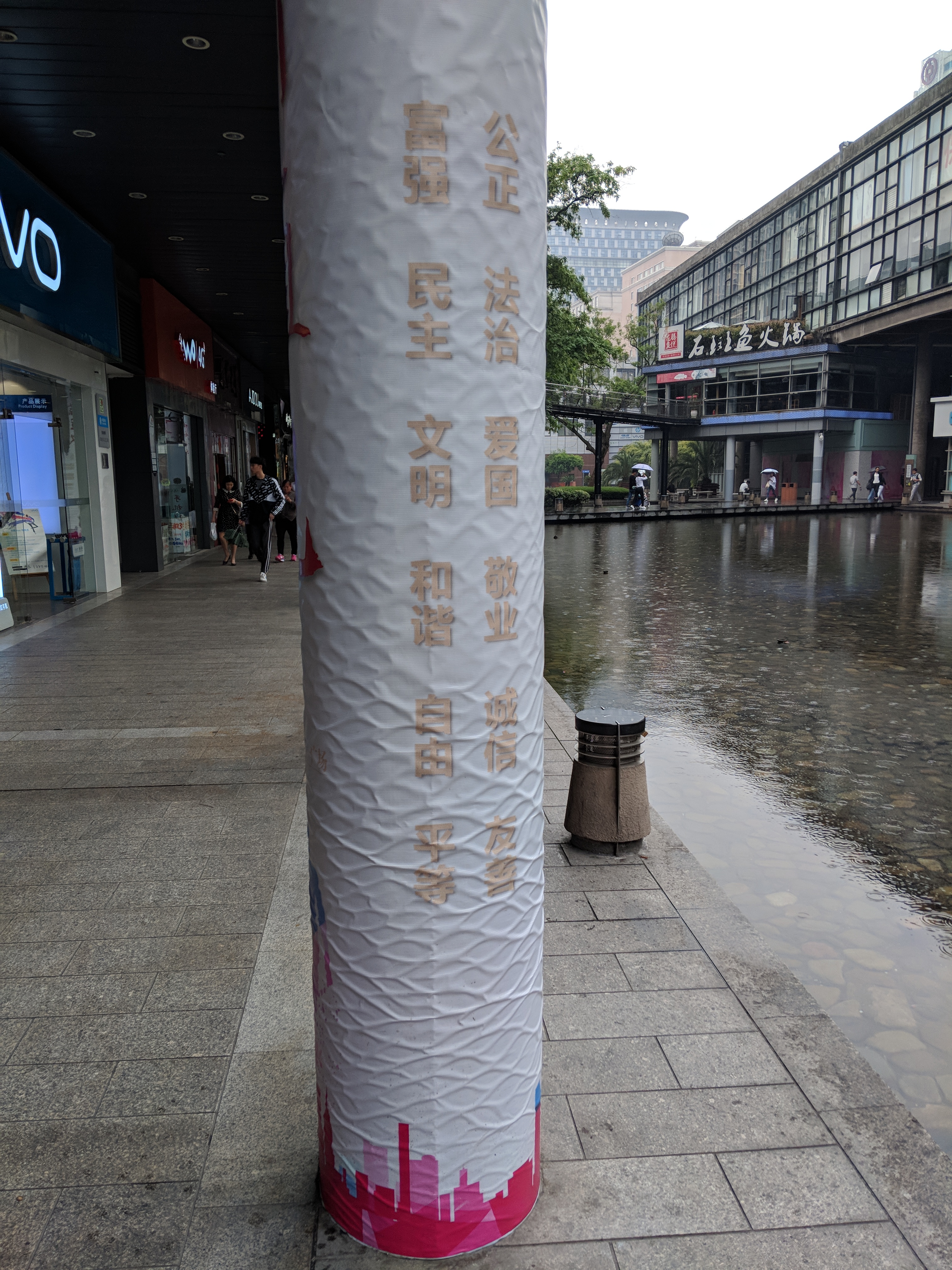
But some don't live up to that ideal. This famous restaurant in Shanghai is supposed to be a Model Wen Ming business, but the waitress was one of the rudest I've encountered anywere.
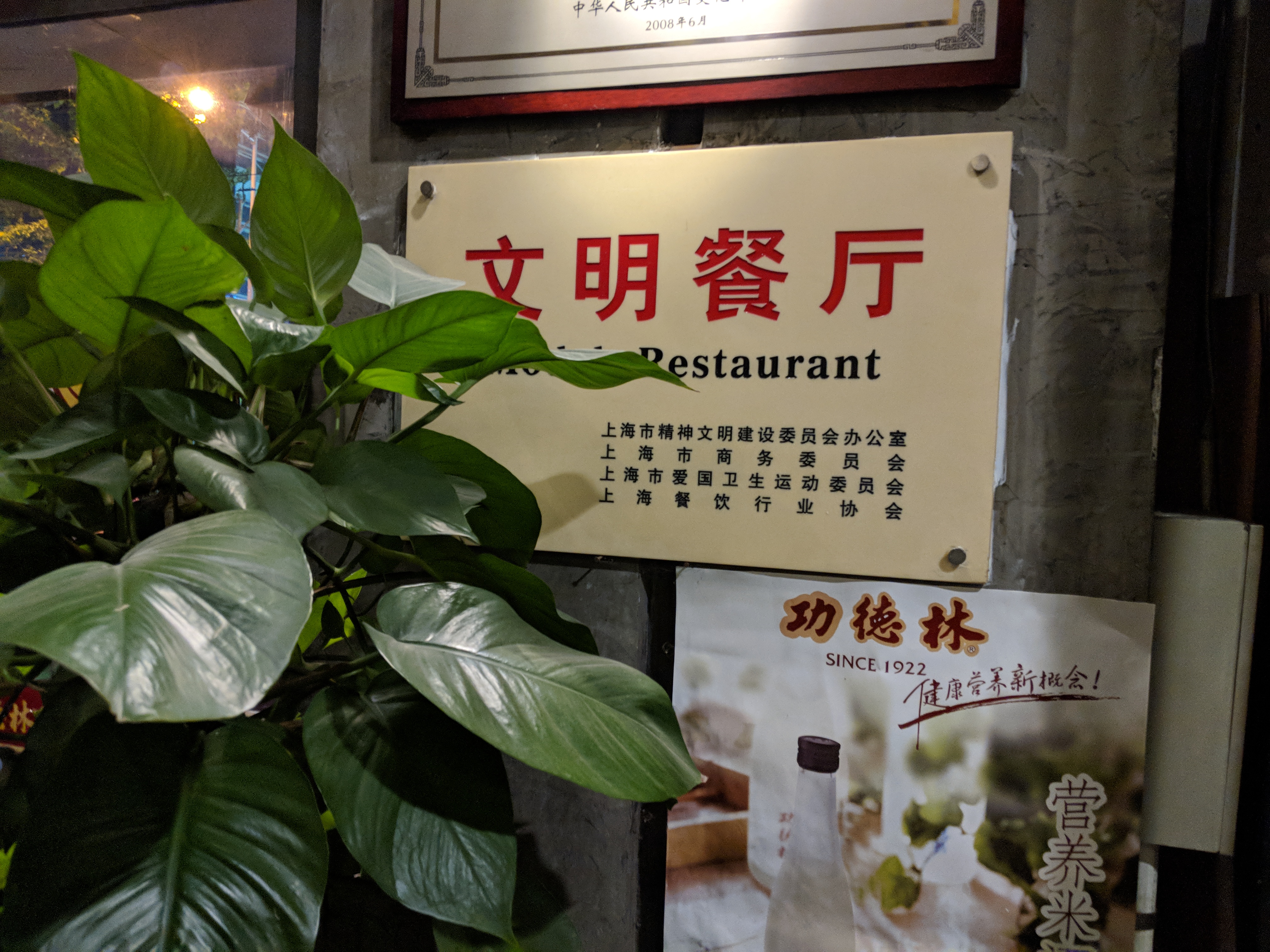
Oh no! Another interminable line! (Waiting for a taxi, Shanghai train station.)
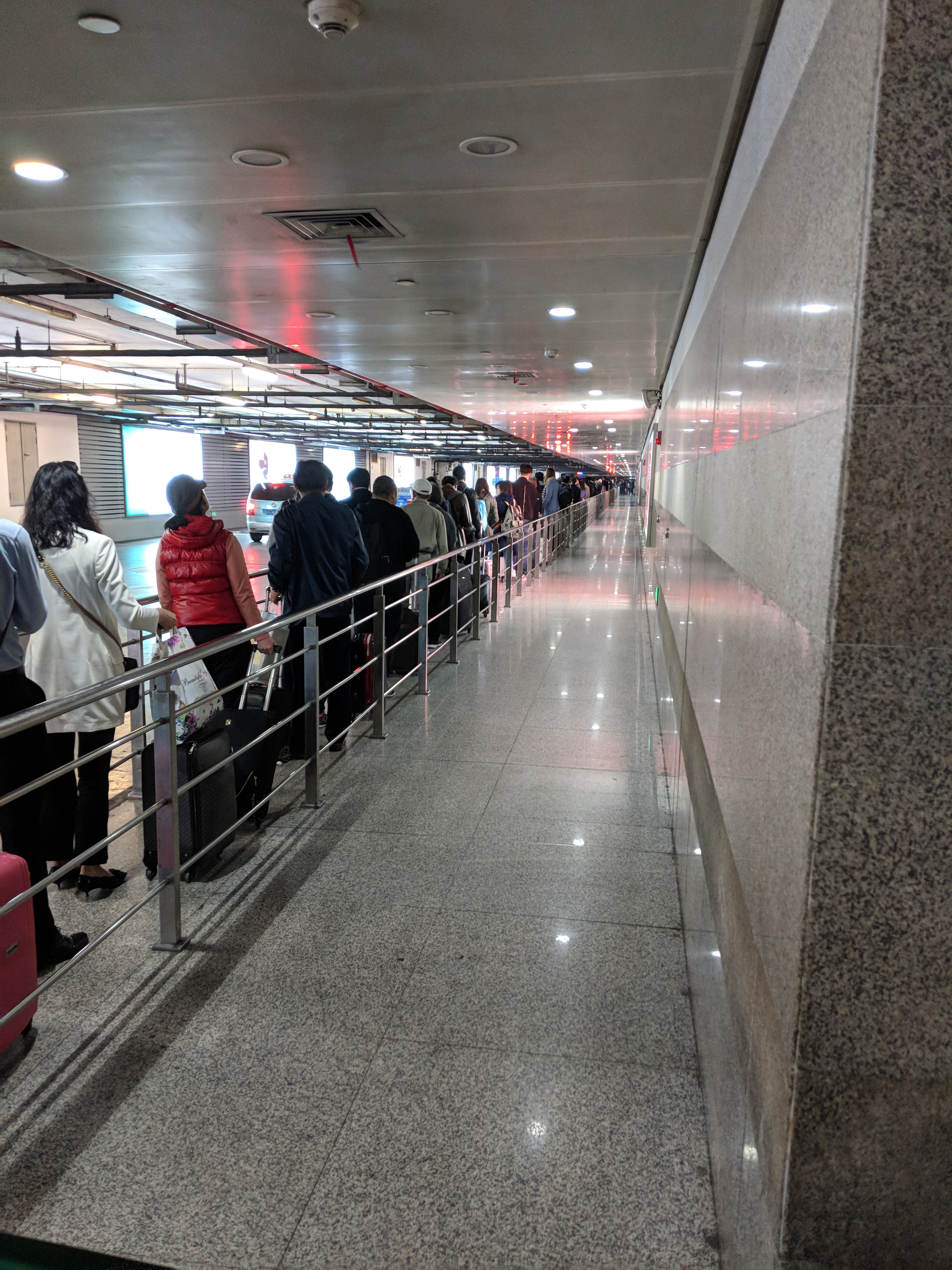
China has a goal to be a world leader in many things by 2025, one of which is Artificial Intelligence. The huge Shanghai bookstore that I mentioned before, Shucheng, has an entire table (front and back) featuring Chinese works on the subject:
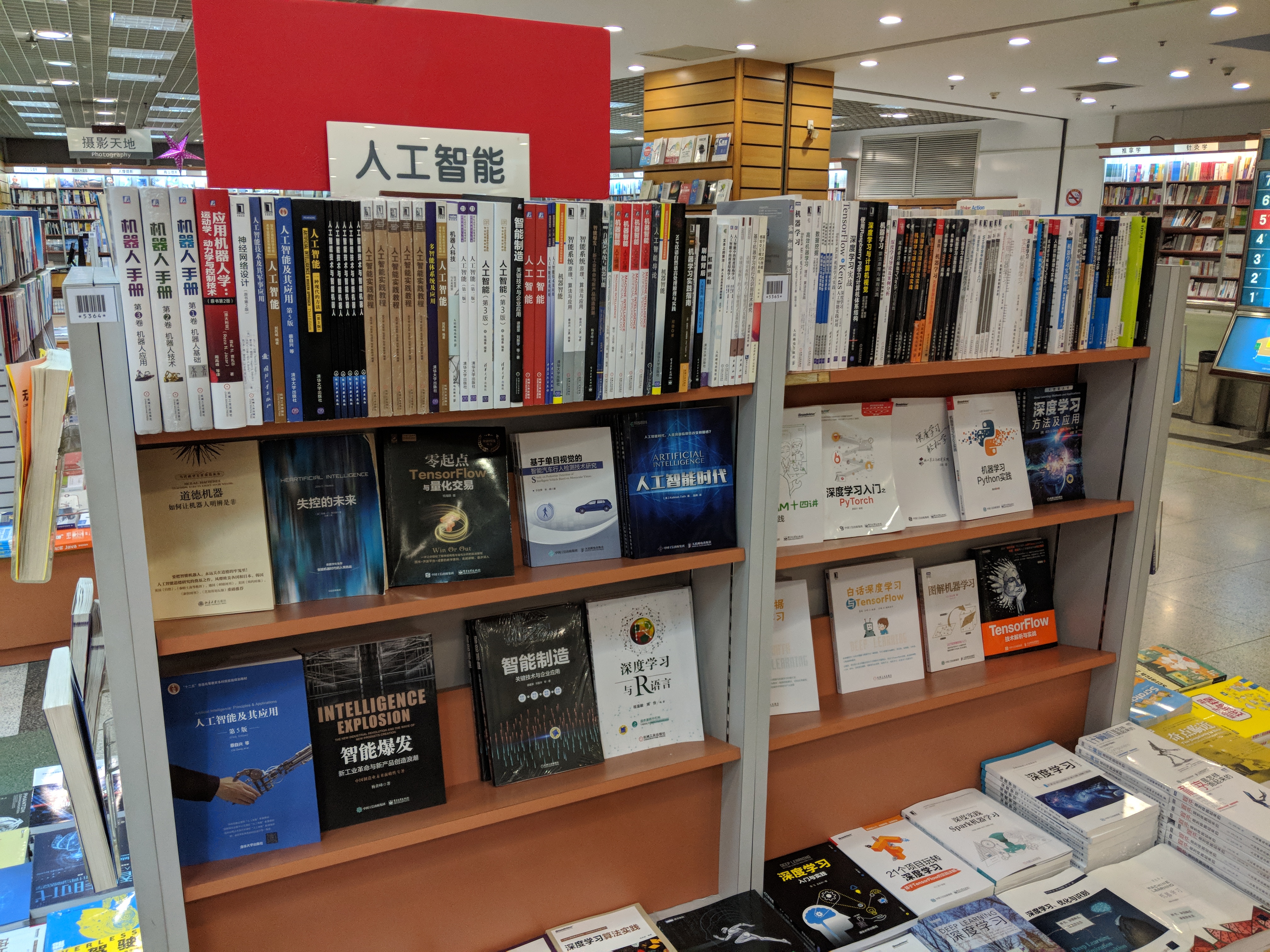
(See my related blog comments.)
On our last day before moving on for a brief stay in Hong Kong, we went for a family outing to Zhu Jia Jiao (朱家角), a restored old town near Shanghai. The name translates to "Zhu Family Corner," a town that used to be populated almost entirely with people surnamed Zhu. This was common in old China; to avoid inbreeding, men would go to a neighboring town for spouses.
There were shops and restaurants along a canal, including boat rides. One of the food stands had a recording that repeatedly blared out "loh hoh chook, loh hoh chook, loh hoh chook,..." -- 老好吃, "old good eating," one of my favorite Shanghainese idioms.
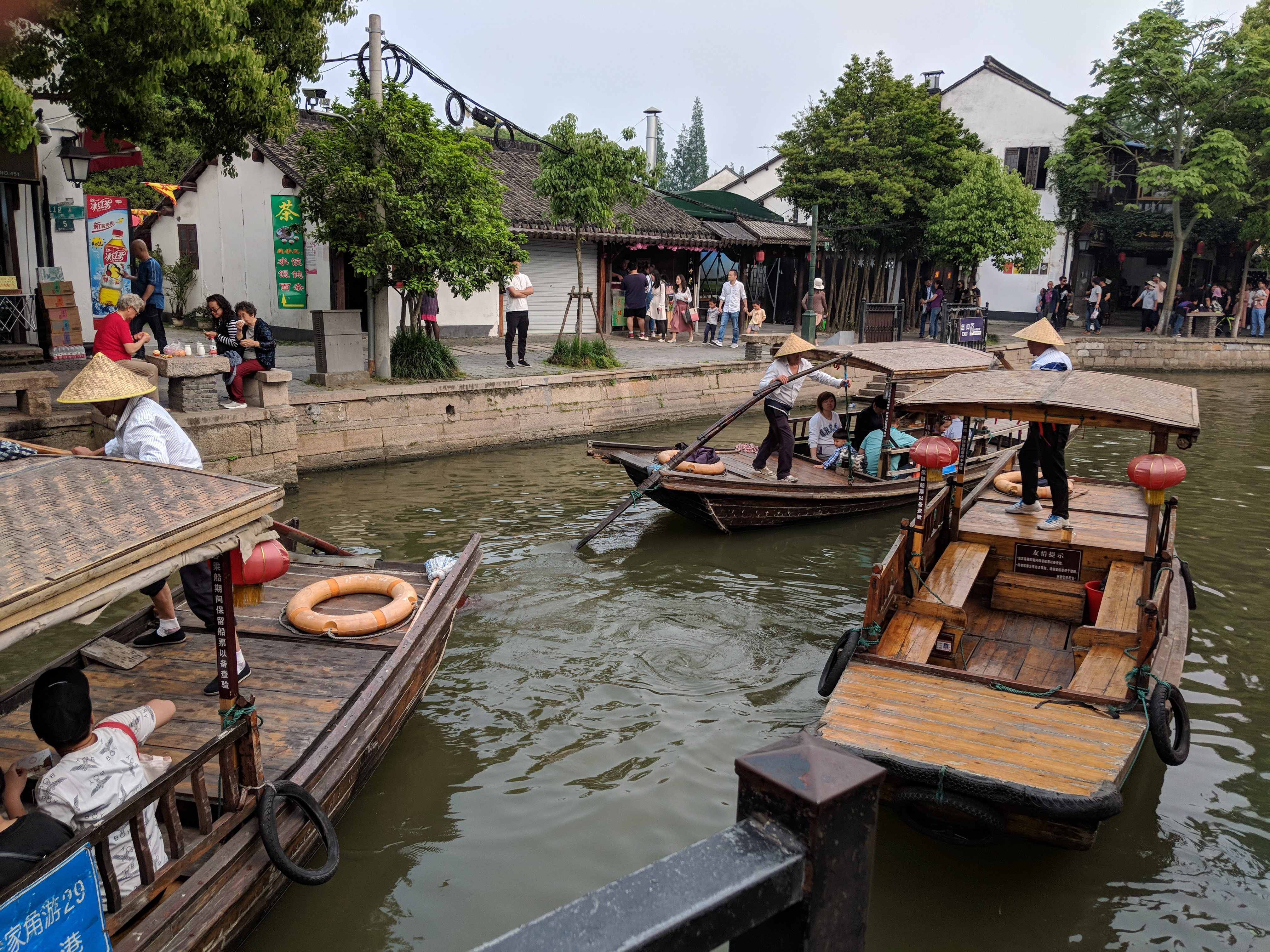
By the way, note the restroom sign. Many public restrooms in China today are remarkably clean. Now THAT is wen ming!
But did you read the sign by the water, "Deep Water! Dangerous! Don't get close!"? If it is that dangerous, why is there no guardrail? On the contrary, they make it easy to get close, with the steps on the opposite bank. Go figure.
Anyway, great trip, great interaction at the university. So there you have it, more fun in Shanghai and Ningbo!